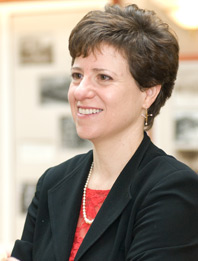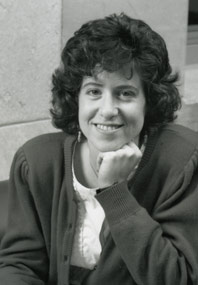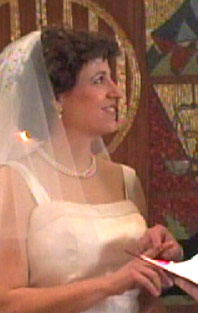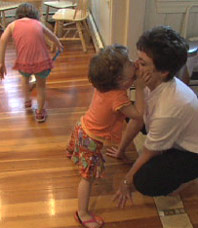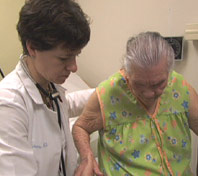Jane LiebschutzServing the underservedNOVA: Has your career met the expectations you had when you went to medical school? Jane Liebschutz: Yes. I went to medical school for a career in public health and service to patients. And now, in my career, I'm doing exactly what I wanted to do when I started. Q: Has the road along the way been easy? Jane: The training was difficult. Medical school and residency were really exhausting and trying. Since then, it's not been as strenuous. Overall, I feel really lucky to have the career I do. Q: As you look ahead, what would you like to do in the future? Jane: I'm very interested in mental health and its relationship to illness and quality of life. A lot of what I spend time doing in my practice is dealing with depression and mental illness that complicates medical problems. Since residency, I've developed a particularly strong interest in violence trauma, domestic violence, and its impact on health. So I'd like to move my career more squarely around understanding and working on those things. Q: Tell me a little about the patients you generally see at Boston Medical Center. Jane: The motto of our hospital is "Exceptional care without exception." Our patients generally don't have other places to go. We try to provide high-level care for patients who may be poor, who may have problems like substance abuse, HIV, domestic violence. We serve a lot of immigrants, some of whom are refugees. Q: And many of your patients have experienced trauma in their lives. Jane: Yes. Eighty percent, four out of five of our patients have had serious life traumas, and most of them have had multiple. What are these traumas? Well, they're not a fender bender. They are being raped, kidnapped, having their houses burned down, witnessing somebody being badly injured or killed, being threatened with a weapon. I think one out of every six patients in our practice has had a family member die by violent means, either suicide or murder. It's astonishing what people have to live with. And most of my patients are not white. They've had to deal with racism and cultural prejudice—some don't speak English well. It's incredible how this impacts health. Q: I would imagine that dealing with such a troubled population might burn out some physicians. Jane: One way to handle this is to get frustrated, burnt out, and leave the profession or go to a different kind of practice. The other way is the route that I've taken, which is to try to study it, try to change the system to make it better. So I teach about it, write about it, train medical students, residents, and other physicians about how to improve their care for patients who have experienced trauma. Q: Is it well understood how physicians should deal with trauma? Jane: To a certain degree, the science behind how to deal with this is new. Twenty-five, 30 years ago, substance abuse was at a similar state, where people recognized that it was a problem with medical consequences but weren't sure how to move forward with treatment. We are probably 20 years or so away from the time that we'll really have all the knowledge to deal with trauma. On the other hand, there are a lot of things we do know. One of the most important things is building relationships with patients. There isn't a drug for violence, but the doctor's therapeutic touch can be the healing pill. Q: Why do you think you are drawn to this kind of work? Jane: I don't know exactly why I'm driven by social justice issues. I don't think there's anything particularly noble about it, but it's really important to me that I feel that I'm creating value in the world and serving people who have fewer opportunities than I do. I also find that it enriches my life and makes me more appreciative and aware of what I have. So it's not just that I'm being altruistic; I'm also getting a lot back from the work that I do. Learning from her patientsQ: In the program, we see you as a young doctor with an AIDS patient named Michael. What do you think when you look back at this scene? Jane: Oh, Michael—I think about him a lot. If only it had been a few years later [with better treatments for HIV], he would be alive today. I learned a lot from Michael. He had such a mature perspective on his disease. Q: What do you think now about how you talked to him and his partner about his impending death? Jane: I would not say that again now. There's no reason to take hope away from patients. Ridiculous. He was right, and I was naive. You learn from those experiences. Q: You had that moment captured on national television. Jane: Yeah, and one of the interesting things about being filmed is that it's like everything is in hyperfocus. You're really self-conscious. And it stays in your memory. "When I turned 40 and I was single, I thought I was never gonna get married." Q: Have you learned lessons from other patients? Jane: So many patients were really good teachers and really patient with me. You can't imagine how appreciated it is when patients at a teaching hospital are willing to let somebody who's less experienced do things. It really does make a difference. I see it with my students today. Q: I'm going to play the scene where you meet with Mr. Collins before he heads into surgery. [video plays] Jane: I think most people look at that scene and think that I was really compassionate and caring. But I wish I could've given him a moment of just acknowledging his fear. I didn't acknowledge his fear. I just smoothed over it, said, "You're gonna be okay." And that's not always true, as we know. Q: Now I'm going to play the scene of the surgery. [video plays] Jane: I hate watching this scene. I can't watch it. I'm getting all choked up now just watching it. It was very painful. Dr. Johnson was really incredible. I could never be a surgeon like him. [Dr. Johnson was the lead surgeon who comforted Jane after Mr. Collins died.] Q: Do you still get emotional dealing with patients? Jane: I'm definitely an emotional person. But now, in my regular life, I can sleep decent hours, and it's easier to keep the emotions in check. Doesn't mean I don't still get emotional sometimes with patients. But it's nothing like that. Work and familyQ: Since I last filmed with you in 2000, are you happy with the course your life has taken? Jane: It's funny. I set certain goals around that time that I have actually achieved. I'm really happy in terms of my academic promotion. I've had some grants. I've published some papers. I feel that I've made a big difference in training future researchers and teachers and clinicians. I love the practice of medicine, and I feel that I have a handle on how to do primary care. And in my personal life, I've found a community, I've found a husband, and I have beautiful children. So things have really come together for me. Q: You got married fairly late in life. Did you ever worry that your career was getting in the way of marriage? Jane: When I turned 40 and I was single, I thought I was never gonna get married. I was really upset about it and wondering if I'd made the wrong career choice. Luckily, I met my husband right after I turned 40. We got married soon after, and we had kids right after. So that worked out great. Q: Did you always want to have kids? Jane: I think I always wanted to be a mom. My three-year-old daughter said to me, "I want to be a mom and a doctor." That's probably what I always had in my head. Q: Do you feel that you have achieved the right balance between work and family life? Jane: It's a constant struggle to find the balance, but I have all the elements in place to carry on that struggle. "The work that we do is highly valued by so many patients but so undervalued by insurers." Q: If you had to do it over, would you choose to go to medical school again? Jane: I think I'm sort of destined for this particular path. People in college considering medical school ask me about it. It's a very hard road, very strenuous. I would say, if you have another avenue that you think you could like equally, something less strenuous, I would say go for it; but if you feel that you have a calling in this direction, then I think it's worth doing. Q: What if your three-year-old daughter still wants to do it when she's older? Jane: I have mixed feelings about it, knowing how hard it was for me, and how strenuous it is, and how much you sacrifice. On the other hand, it's just an incredible gift, being a physician, and so if that's her path, I'll support her on it. Health-care problemsQ: What do you think about the amount of insurance paperwork that doctors deal with these days? Jane: What's happened in the past eight to 10 years has been amazingly frustrating. There was a study recently published in the Annals of Internal Medicine that looked at the paperwork time, and it's like 20 percent above and beyond the clinical face-to-face time. So for every four to five hours of seeing patients, I have at least another hour of paperwork. I understand the need to protect against fraud. I understand that physicians are not that good at policing themselves. But so much paperwork is just an incredible burden. Q: Do you have thoughts on how to fix the health-care system? Jane: I personally feel that there should be universal health care, and I think getting rid of all the competition and the insurance companies and having just a single, government payer, like Medicare, would be extremely effective. The Veterans' Affairs hospitals are sort of a mini experiment in socialized medicine. Despite the fact that veterans who use those services tend to be poor and have many medical and psychological problems, these hospitals have a high level of care for lower cost. It's really a wake-up call for our country that we can provide better medicine at lower cost if we do it in a different fashion. Q: What do you think about how your specialty, primary care medicine, is regarded in the current system? Jane: It really upsets me that it doesn't have higher status and higher pay. I could spend 45 minutes in my office convincing a patient to have a colonoscopy to prevent colon cancer, and what will I get compensated? $130 or something. The same patient goes to have their colonoscopy, and the gastroenterologist gets paid $600. The work that we do is highly valued by so many patients but so undervalued by insurers. I find it crazy. And the evidence is that if patients have good primary care, they're less likely to use expensive procedures and less likely to use the emergency room, etc. So why don't we compensate doctors who do primary care more and attract more people into the field? Q: Building a relationship with a patient isn't something that health insurance covers, is it? Jane: Yeah, it's sad that talking does not get as well compensated as using some fancy machine, whereas talking is probably more beneficial than a lot of other things that we spend money on. |
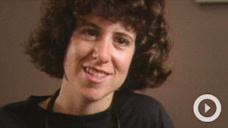

Watch Jane Liebschutz's journey from med school to midlife in scenes from "Doctors' Diaries." (Running times 12:16 and 9:26) Also, see bonus video of Jane watching scenes from the program. 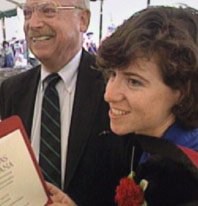
Jane with her father at graduation. She says that the most meaningful moment in her life, both as a doctor and a daughter, was being able to comfort her father when he was terminally ill a decade later. |
|
Interview conducted in July 2008 by Michael Barnes, producer of "Doctors' Diaries," and edited by Susan K. Lewis, senior editor of NOVA Online Doctors' Diaries Home | Send Feedback | Image Credits | Support NOVA |
© | Created February 2009 |
|
|
|







